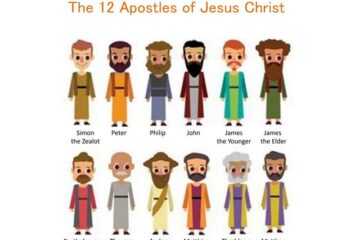It is interesting in these times of liberalism and perversion of the truth that some church leaders (in terms of Evangelists/Ministers) do not exemplify the life of Christ as they should. The example that is set by the leadership as sanctioned in scripture have double the responsibility to insure that sound principles are taught and that their lives exemplify that which is taught. For some though, they believe that their position of leadership is one without accountability to its members and this is where their prideful and fallacious understanding can ultimately bring condemnation to their souls.
In order to fulfill that which is “of Christ”, they must behave in a manner that is “as Christ” (See Phil 2:1-5). In other words, to bring an old expression to bear; “What would Jesus do?”.
Office of Evangelist/Minister
The office of Evangelist is in the chronological development of the early church and exists as well today. The evangelist is given a specific role as stated by Paul in Tit. 1:5 which says;
“The reason I left you in Crete was that you might straighten out what was left unfinished and appoint elders in every town, as I directed you.”
So the delegated role of the evangelist is to 1) set in order the things that are wanting, and 2) ordain elders in every city. Thus, the first influence on a congregation is exercised by the evangelist. He is to organize the congregation according to God’s pattern of organization which means ordaining elders and deacons and teaching the doctrine of Christ to “men who shall be able to teach others” (2 Tim. 2:1-2).
While the qualifications of these faithful and able men who are taught by evangelist are clearly outlined in Paul’s letters to Timothy and Titus, the qualifications of the evangelist are also revealed in these books. The qualifications for the evangelist are outlined as follows:
- He must live the Christian life and preach the doctrine of Christ (1 Tim. 4:16; 2 Tim. 4:2).
- He must be a student of the word (2 Tim. 4:13, 15-16; 2 Tim. 2:15).
- He must be an example of Christian decorum (1 Tim. 4:12).
- He must devote his life to his Christian work (1 Tim. 4:16; 2 Tim. 2:4).
- He must not be a “hobbyist” (1 Tim. 6:20-21; 2 Tim. 2:14-18).
- He must, with congregational approval, appoint qualified officers for the church (Tit. 1:5; Act. 6:3).
- He must be prepared to arbitrate problems between members and officers and not act hastily in judgement (1 Tim. 5:19-22).
While the evangelist is the first major influence and the most visible in the congregation, he is not “the boss” who is not subject to anybody. The Bible tells us that we are to be submitting ourselves one to another in the fear of God (Eph. 5:21). Although the evangelist does have authority in his sphere of work (Tit. 2:15), he accepts the fact that he is not the CEO. Jesus already has that position (Eph. 1:21-23; Col. 1:18, 24).
Problem Evangelist/Minister Example
One particular evangelist suggested incorrectly that their occupation (job) has nothing to do with their spiritual development or the example of leadership within the congregation, or should his job adversely affect those that would follow his teaching. It is inconceivable that a minister of the Lord’s word would take such an indefensible position.
When this certain minister was approached by a member of the congregation regarding his occupation (he works for the lottery), he was quick to respond in anger (publicly and to the point of loss of character) and offered in ignorance that if his occupation was wrong, then every Christian everywhere would have to quit their jobs where there was sin. The fiasco that followed which involved nearly every brother in the congregation did more harm to the body of Christ than could be measured. It ultimately caused the congregation to lose an entire family in its membership and disorient others. Worse still, several meetings of the brothers were held without the despondent members present, escalating the matter to the point of disfellowship being considered. It is clear through these results that nothing was followed according to scripture. What is of particular note here is that this minister displays his job on public television, thus making his occupation obvious to anyone with a gambling problem.
There are several problems with this situation and particularly that the minister did not address this matter with the proper attitude and in accordance with scripture.
- He is mistaken in believing his occupation has no bearing on his life in Christ.
- His teaching ability is directly related to what people see his life as inside and outside of Sunday worship.
- His temperament brings into question his ability to fulfill the position.
- As a result of his public display of anguish, he disoriented and caused a brother to stumble.
- The resulting activities during and after these events changed the nature of loyalty from Christ to himself.
- He did not repent of his behavior nor did he feel any reason to do so.
- He made essentially no effort to retrieve the lost sheep into the fold.
- He took action against the despondent brother when no sin was present. (He actually said the brother hadn’t sinned but could not offer a valid reason for removing him from worship duties).
- He allowed human thinking and judgement to make void the word of God.
Now with respect to this person zeal for Christ, there is no question being made here as to his faith in Christ, but rather as to his knowledge and understanding; as Paul says in the scriptures;
“For I bear them record that they have a zeal of God, but not according to knowledge” (Rom. 10:2).
“Knowledge” as spoken here correspond to “spiritual” knowledge and understanding and not simply the memorization or surface comprehension of scripture. In fact, knowledge being misunderstood in scripture can cause one in the leadership to become “puffed up” as it states in 1 Cor. 8:1-3. This is what happens when someone who seemingly has a sound biblical knowledge is not spiritually mature. To understand the dynamic interaction of charity with knowledge is to know what it truly means to be spiritually mature. It is not just a matter of being “nice” but being obvious and consistent in emotional stature. For the discerning individual, one knows when another is angry, sad or discontent in some way. Leaders in the congregation are watched more closely than any other member.
The scriptures are clear regarding the expectations of the leadership in a congregation of Christ’s church. Their position is one sanctioned by the authority of God and their conduct should be one of love and respect for the concerns of their fellow brothers and sisters. They are the shepherds and caregivers of the flock. Essentially, as all Christians are to serve God in humility, the leadership although in a position thereof must “serve the membership” with piety before God. Their authority is not of itself but of the Father. Paul says again regarding Christian conduct;
“For I say, through the grace given unto me, to every man that is among you, not to think of himself more highly than he ought to think; but to think soberly, according as God hath dealt to every man the measure of faith” (Rom. 12:3).
And if any man thinks that he knows anything, he knows nothing yet as he ought to know (1 Cor. 8:2).
The problem with authority in our society is that if left unchecked, it can cause a person to feel ‘above’ someone else. Biblical knowledge as it may seem can create a false sense of confidence when that knowledge is not assimilated properly.
You can’t have one foot in the world and another in the church, especially as a leader of a congregation. To serve by example does not mean to be sinless but rather to be “blameless”. What our brother minister does not understand is that it is not the job in and of itself that is wrong but the influence it has on others in the body or those that would come to Christ.
“All things are lawful for me, but all things are not expedient: all things are lawful for me, but all things edify not” (1 Cor. 10:23).
Paul indicates in this scripture that personal freedom and desire for one’s rights (such as to work and support ones family) are not the only considerations. One must also consider the good of his neighbor. One of the goals of the leadership is to edify both in word and deed.
Paul clarifies the issue of influence in Rom. 14:14-23 in the context of meat and grievances as they relate to causing a brother to stumble. A key point of this scripture is that as Christians, we are not to do anything that would in effect, condone or encourage our brother to sin. So this errant minister by displaying himself on TV on Saturday is in a position to cause a member who has a gambling problem to stumble, and then expect them to come to worship on Sunday. Now imagine the sermon being preached on gambling. It is obvious the conflict of interest that exists in this situation.
An important aspect of spiritual development and people here is that when a brother is doing something that offends another or is not in consistency with biblical teaching, then that brother must “act” positively on the issue. Both must be receptive to study and scripture should be the only guide. This begins with bringing the matter to the attention of the offender by the offended and subsequent principles as defined in Mat. 18:15-17. Anytime a matter results in a member leaving the congregation or others losing confidence in the leadership, it is the leaders fault. Why? Because the leader if being truly so, would be able to address matters within scripture and with an attitude of love to bring about resolution before God and maintain the confidence of its members through humility and knowledge. This is not to say that learning members can’t be wrong for it happens all the time. It is easily conceivable that neither party ‘really’ want to know the truth in some cases. However, when both parties are sincere in desiring the truth of a situation and when God’s word is used, there can never be misunderstanding for God’s word can only bring understanding.
What Should Have Happened
It is easy for situations to spin out of control when more emotion is involved than scripture. In the scenario given, the congregation had no elders or deacons in which to offer arbitration. So the despondent member was faced with a problem for which the minister was both part of the problem and the renderer of judgement. It’s like taking the local magistrate to court in his own jurisdiction. You have to convince him to rule in your favor, which means against himself, but he is both the defense and judge in the case.
Since there were several issues with regards to this scenario. Each problem should have been separated and dealt with individually. What should have occurred was that the minister should have taken the matter to heart and sat down with his brother and study the word of God, discussing honestly and without undue emotion what was being learned, and through the spirit, letting God decide on the matter. First whether the issue was a valid one (which it was) and then on what to do about it. Jesus provided a full and complete course of action on unresolved matters but I’m inclined to believe this is one that would not have qualified beyond a simple meeting of the minds under the safe judgement of God’s word. I doubt that Jesus would have saw this as a serious matter worthy of the churches participation or even a significant number of the brotherhood.
Jesus in Mat. 18:16 did not specifically define the qualifications of the “two or more” that should be taken with you but by example, it is clear that he meant two or more spiritually sound, knowledgeable and neutral individuals. This is indicative of the nature of events in the sequence. If two people with a problem cannot find resolution in their understanding of a particular problem, then it is not likely that you would get the help of someone ‘less’ qualified but rather ‘more’ or ‘equally’ qualified. Neutrality is key since it works against the desires of personal relationships (who likes who) and keeps the focus on what God says.
In the end, solutions to problems between members and leadership can only be addressed appropriately by “the book”. It will nourish each party to reconciliation of themselves with God and with each other.
Conclusion
In the case of our example of the errant minister, he failed in several areas regarding patience, love and diligence towards scripture in establishing truth and accepting that truth when recognized. He also failed in earnestly pursuing the loss of the sheep from the fold and not reestablishing himself blameless before God. It is hopeful that such a person will find the error in their ways and correct them before it is everlastingly too late.
For the members who become disoriented by their leadership or other members, the best solution is to study the scriptures and invite into fellowship those who they are aware a better relationship is needed. Problems will always be pervasive as in any family and the body of Christ as exists in our mortal realm is no different.
When God’s word helps to resolve difficulties is to identify and show the glory and wisdom of God in our lives.


